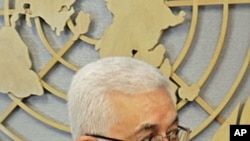Palestinian leader Mahmoud Abbas said Monday he will formally submit an application for Palestinian membership in the United Nations on Friday. Mr. Abbas met U.N. Secretary-General Ban Ki-moon as U.S. and European diplomats continued efforts to re-start direct Israeli-Palestinian peace talks and prevent a political clash at the U.N.
The Palestinian leader again said he will seek membership status in some form in the United Nations.
But his decision to submit the request in conjunction with his U.N. General Assembly speech on Friday leaves time for more diplomacy by the international Middle East Quartet aimed at heading off a U.N. confrontation that could set back regional peace hopes.
The Quartet - made up of the United States, the European Union, Russia and the United Nations - are trying to come up with a framework for resuming Israeli-Palestinian peace talks that both sides would accept and prompt the Palestinians to set aside their membership bid in the U.N.
Addressing the Council on Foreign Relations in New York Monday, French Foreign Minister Alain Juppe said the status quo between Israel and the Palestinians is unacceptable and could lead to an explosion of violence.
But at the same time, he said a Palestinian bid for full-fledged U.N. membership in the Security Council - facing a U.S. veto - would yield nothing but frustration.
“If the Palestinians go to the Security Council, the resolution will not pass, of course, and you know why," said Juppe. "Maybe there will not be the nine votes to pass the resolution and if there are nine votes, the American government has announced it will veto the resolution. So there is no outcome at this level.”
The Palestinians could avoid the Security Council and seek to upgrade their observer status in the U.N. General Assembly.
That would allow them to, among other things, pursue action against Israel in the International Criminal Court on such issues as Jewish settlements in the West Bank.
But Israel’s Deputy Foreign Minister Danny Ayalon warned late Sunday Israel would counter with its own ICC cases on such things as terrorism and human rights violations by the radical Palestinian faction Hamas which controls Gaza.
“I must emphasize, we stand ready to cooperate with the Palestinians, to negotiate with the Palestinians, and to come at an agreed upon solution," said Ayalon. "It has to come on both sides. Any attempt to take the conflict into international fora, be it here, be it in The Hague, be it in Geneva, will be futile."
Former British Prime Minister Tony Blair, special envoy for the Quartet, says the group is seeking a mutually-agreed framework on which a renewal of direct talks can be based, regardless of any statehood action at the U.N.
“What we’re looking to do is to put together a structure for this statement that makes it clear what the basic shape and direction of this negotiation should be, so a state of Palestine is viable and contiguous, sovereign and independent, so that Israelis feel that their security interests are properly protected," said Blair. "And I think there is also broad agreement now that there should be a clear time-line for this.”
U.S. Secretary of State Hillary Clinton is holding a series of bilateral meetings with foreign ministers in New York in support of Quartet diplomacy.
In a meeting Monday with Turkish Foreign Minister Ahmet Davutoglu, she urged Ankara to “keep the door open” to improving relations with Israel.
Those ties have been in a tail-spin since Israel killed nine Turkish citizens when it intercepted aid boats trying to break the Israeli blockade of Gaza last year.
Abbas: Palestinians Submitting Statehood Bid Friday




